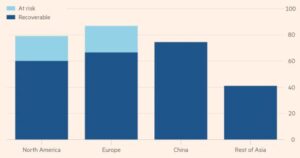The present year has been challenging and unprecedented for the automobile industry because of the brutal second wave of the Covid-19 pandemic. The disruption in the supply chain and shortages has an adverse impact on the automobile industry in 2020. However, situations were improving at the beginning of 2021 but the occurrence of the second wave again plucked up the supply chain issues for the automobile industry especially in India. Almost every manufacturing company in this sector has been affected due to the crunch in the supply chain.

Fig: Showing the scarcity of chips across different continents (Source: Marinova & Bitri, 2021)
The shortage of semi-conductors consequently impacted production. However, the sales were at the peak at the starting of the year but the supply chain issues continue to grow. This in turn is hindering the demands and production of cars in India. Despite being impacted by the supply crisis, Maruti Suzuki surpassed its sales last year. It is showing a great sign of recovery from the catastrophe. Nevertheless, other companies are still dealing with the crisis. While digging into the reasons for chip shortage, it has been found that due to the adoption of the remote working and work from home culture, the demand for chips in electronic devices has increased significantly. This indicates that there would be a waiting period for the industries worldwide. Since the automobile sector in India is in a high-value business, the shortage of chips is incurring the highest loss.
“The recovery from this catastrophe is looking compromising until the problem is mitigated” – Neeraj Thakur.

One of the major causes of the ongoing shortage of chips is the dominance of Taiwan in manufacturing. The semiconductors are being sourced from Taiwan which is creating issues for the Indian industries since the outbreak of the covid 19 pandemic. Unfortunately, the Indian automobile industry is losing out on sales due to the scarcity of significant chips. In this case, there is a great opportunity for India to develop a cost-effective ecosystem while alliancing with other countries for the supply of chips. The future of the Indian automobile industry is still questionable and depended on the recovery.
References
Marinova, G. I., & Bitri, A. K. (2021). Challenges and opportunities for semiconductor and electronic design automation industry in post-Covid-19 years. In IOP Conference Series: Materials Science and Engineering, 012036. Retrieved from https://iopscience.iop.org/article/10.1088/1757-899X/1208/1/012036/pdf
Neeraj Thakur (2021) Can Indian Auto Industry Overcome The Challenge Of Chip Shortage?. Outlook. Retrieved from https://www.outlookindia.com/website/story/business-news-chip-shortage-and-the-future-of-indian-auto-industry/404259
Wu, X. Z., & Du, W. (2021). An analysis on the crisis of “chips shortage” in the automobile industry——Based on the double influence of COVID-19 and trade friction. In Journal of Physics: Conference Series, 012100. Retrieved from https://iopscience.iop.org/article/10.1088/1742-6596/1971/1/012100/pdf